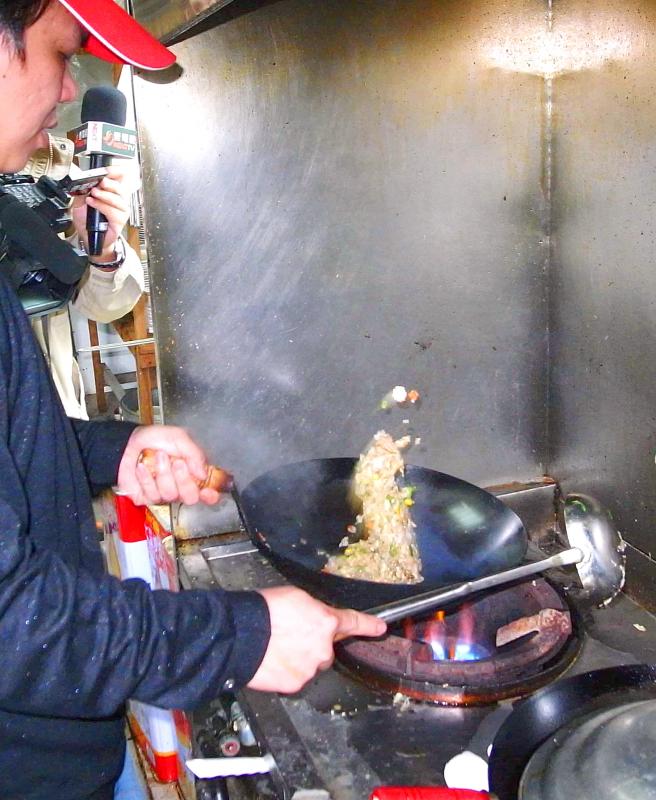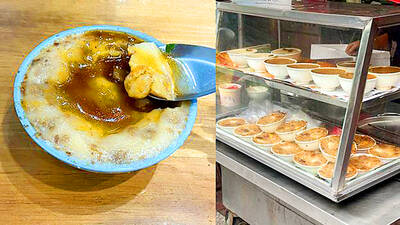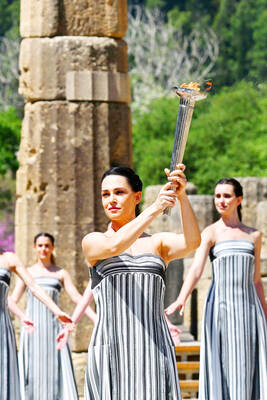A: With egg fried rice, do you stir-fry the egg first or the rice? Or do you stir-fry them together?
B: First stir-fry the egg, I think. My mother would first put the beaten egg into the wok, fry it quickly until half done, and then put in the rice, like that.
A: Wow, when you stir-fry the rice, you wield that spatula like a real pro! I never expected you were this good.

Photo: Hua Meng-ching, Liberty Times 照片:自由時報記者花孟璟
B: Ha, and now we can throw in the fried onion and garlic, and then add the leftover shredded pork and prawns from yesterday.
A: Mmm…, that smells great!
B: Finally, add the chopped green onion, sprinkle over a bit of soy sauce, mix it all together, and voila!
A: 蛋炒飯是要先炒蛋,還是先炒飯?還是一起炒?
B: 先炒蛋吧,我看我媽都是先把打好的蛋放進鍋裡,快速炒到半熟,然後再把飯放進去,像這樣。
A: 哇,你用鍋鏟翻炒的手勢看起來好專業喔!沒想到你這麼厲害!
B: 哈哈,我們現在可以把剛剛爆香的洋蔥和蒜一起放進去,再加上昨天吃剩的肉絲和蝦仁。
A: 嗯,好香喔!
B: 最後加上蔥花,再淋點醬油拌炒,就大功告成了!
(Translated by Paul Cooper, Taipei Times/台北時報林俐凱)
Audio recordings for Speak Up! dialogues will be suspended until further notice due to the pandemic.

Rice is an essential ingredient in Taiwanese cuisine. Many foods are made of rice, adding more variety to our cooking, such as rice cake, or “gui.” Wagui is made by steaming rice flour batter in a bowl. The term “gui” refers to a type of food made from rice, while “wa” refers to a bowl. The pronunciation of “gui” in Taiwanese Hokkien is similar to the word for “nobility” in Chinese, so it is common for people to prepare various types of gui, including wagui, as offerings to the gods or ancestors,. 米是台灣重要的主食,用米製成的食品十分多元,豐富我們的飲食,如米做成的「粿」。粿的意思是米做成的糕點,碗粿是將在來米漿倒入碗中蒸熟,因而得名。粿因為音同「貴」,因此碗粿等粿食常用作供品祭拜神明和祖先。 nobility (n.) 高貴,高尚;貴族 offering (n.) 供品 While Taiwan may not be

Drive-through (or drive-thru) restaurants provide people with the immense convenience of being able to purchase and pick up meals without needing to leave their vehicles. These restaurants have been around for decades, and their success has spawned a number of equally handy services. The drive-through concept originated with the drive-in restaurant, the first of which was established in the US in 1921. Patrons would order and eat the food that was delivered to their cars by workers called “carhops.” Ten years later, a drive-through service was introduced, but it was not until 1947 that the first exclusively drive-through restaurant opened its

On Tuesday last week, the flame for this summer’s Paris Olympics was lit at the birthplace of the ancient Olympic Games in southern Greece in a meticulously choreographed ceremony. It will then be carried through Greece for more than 5,000km before being handed over to French organizers at the Athens venue used for the first modern Olympics in 1896. The pageantry at Olympia has been an essential part of every Olympics for nearly 90 years since the Games in Berlin. It’s meant to provide an ineluctable link between the modern event and the ancient Greek original on which it was initially modelled. Once

A: “Forbes” magazine just revealed Hollywood’s top 10 highest-paid stars of 2023. B: How much did those superstars make last year? A: Denzel Washington was at No. 10, having made US$24 million, which is about NT$771 million. B: That’s an astronomical figure to me. A: No. 9 to No. 6 were: Ben Affleck with US$38 million, Jason Statham with US$41 million, Leonardo DiCaprio with US$41 million, and Jennifer Aniston with US$42 million. A: 《富比世》最近公布了好萊塢去年的片酬排行榜。 B: 大明星的片酬到底有多高? A: 第10名是丹佐華盛頓、片酬2400萬美元,大約7.7億台幣。 B: 天啊這根本是天文數字! A: 第9到6名是︰班艾佛列克、3800萬美元,傑森史塔森、4100萬美元,李奧納多狄卡皮歐、4100萬美元,珍妮佛安妮斯頓、4200萬美元。 (By Eddy Chang, Taipei Times/台北時報張聖恩)